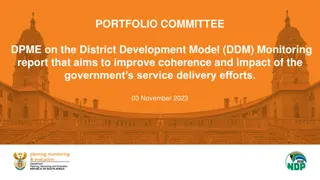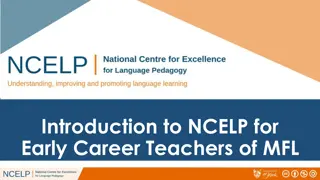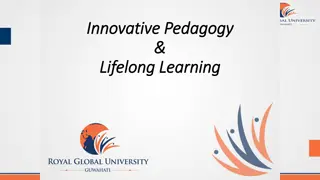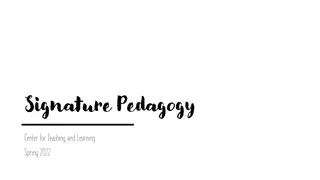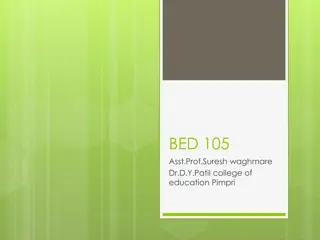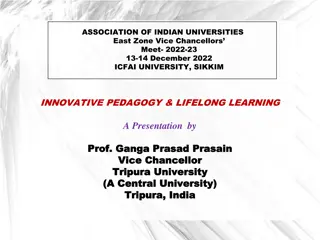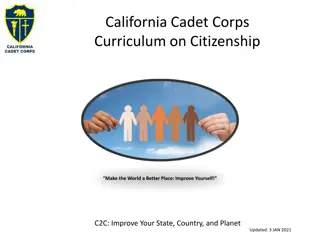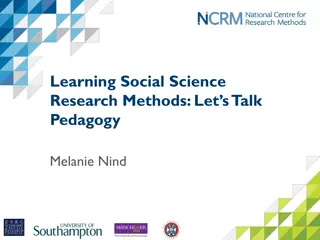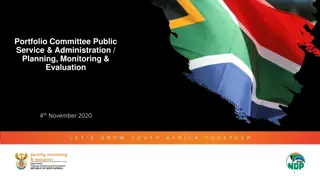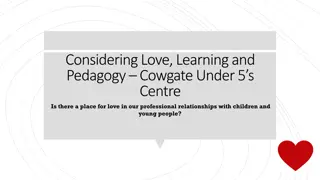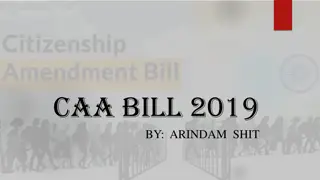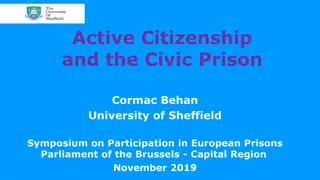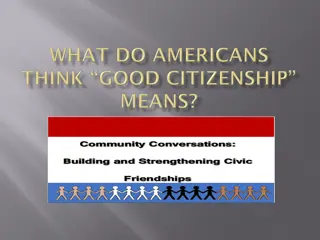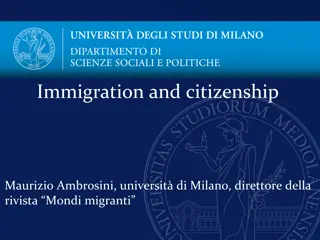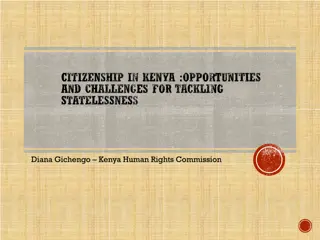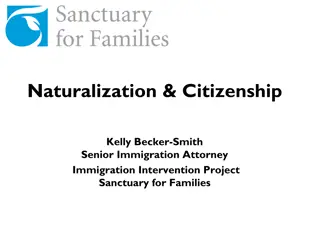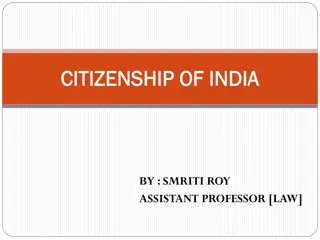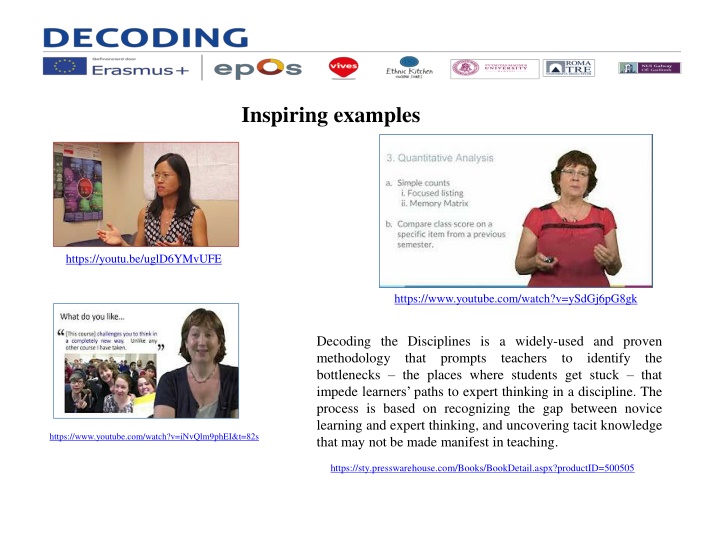
Decoding the Disciplines in Pedagogy of Interculture and Citizenship
Explore the methodology of Decoding the Disciplines, a proven approach to overcoming learning bottlenecks and advancing expert thinking in various disciplines. Uncover the interdependence of facts, cultures, and politics in shaping global education and fostering critical thinking for democratic citizenship.
Uploaded on | 0 Views
Download Presentation

Please find below an Image/Link to download the presentation.
The content on the website is provided AS IS for your information and personal use only. It may not be sold, licensed, or shared on other websites without obtaining consent from the author. If you encounter any issues during the download, it is possible that the publisher has removed the file from their server.
You are allowed to download the files provided on this website for personal or commercial use, subject to the condition that they are used lawfully. All files are the property of their respective owners.
The content on the website is provided AS IS for your information and personal use only. It may not be sold, licensed, or shared on other websites without obtaining consent from the author.
E N D
Presentation Transcript
Inspiring examples https://youtu.be/uglD6YMvUFE https://www.youtube.com/watch?v=ySdGj6pG8gk Decoding the Disciplines is a widely-used and proven methodology that prompts bottlenecks the places where students get stuck that impede learners paths to expert thinking in a discipline. The process is based on recognizing the gap between novice learning and expert thinking, and uncovering tacit knowledge that may not be made manifest in teaching. teachers to identify the https://www.youtube.com/watch?v=iNvQlm9phEI&t=82s https://sty.presswarehouse.com/Books/BookDetail.aspx?productID=500505
Seven Steps in the Decoding Process ORIGINAL ALL DISCIPLINES IN PEDAGOGY OF INTERCULTURE AND CITIZENSHIP decoding-the-disciplines 1. Identify a bottleneck to learning 2. Uncover the mental tasks needed to overcome the bottleneck 3. Model these tasks 4. Give students practice and feedback 5. Motivate and lessen resistance 6. Assess student mastery 7.Share what has been learned through the Decoding process 1. Presentation in class 2. Uncover the interdependence 3. Resources to think 4. Production of comments presented in class and open discussion 5. Thresfold concepts 6. Metacognition 7. Awareness of the process
Decoding the Disciplines in Pedagogy of Interculture and Citizenship Metacognition Interdependence Facts, cultures, politics are shaping the world education, single elements are part of a whole and global understanding, the awareness of this interaction of the part with the whole, and of the whole with the part, educate to critical thinking and generate democratic citizenship.
Decoding the Disciplines in Pedagogy of Interculture and Citizenship 3. Resources: DAD- Ius culturae 4. Multiculturalism and Citizenship: reading what other are doing 5. Differences and similarities: questions 6. 6. Production of New knowledge 7.
Bottleneck Difficult is to analyse elements which are source of the whole outcome. A significant numbers of students have no idea of what is the connection between the main object of the course (Education for Democracy) and single processes (the National debate on citizenship, the process of multiculturalism and the children migration). Students difficulty is to generate their own learning process going through evidences taken from specific documents selected according to the main argument of the course.
Argument Democracy is when we read local contemporary diversity and find mutual influences to product critical thinking.
Thresfold concepts EDUCATION Migration Multiculturalism Citizenship Democracy
Resources USA: DACA Deferred Action for Childhood Arrivals Italy: Citizenship for migrant children, ius culturae Australia: Migrant children UK: Multiculturalism and Citizenship Council of Europe: Culture of democracy
Anne-Swift-nee-Duxbury-with-her- party-arriving-in-1950.-Anne-is-far- left-holding-the-large-baby-doll Child labor in the United States, 900 Anna Sciacchitano from Italy with children arrival to Ellis Island , 900 http://www.bbc.com/news/video_and_audio/headline s/42546065/starved-beaten-enslaved
DACA: The presidents decision to wind down DACA threw into question the fate of 250,000 school-age children who have become eligible for the policy s protections since Obama began the program in 2012. An estimated 20,000 teachers are also eligible for those measures. Uncertainty for DACA recipients https://youtu.be/9QbahiMrGaQ https://youtu.be/9QbahiMrGaQ http://www.bbc.com/news/av/world-us-canada-40488460/deported-american-changing-lives-in-mexico http://www.bbc.com/news/av/world-us-canada- 40488460/deported-american-changing-lives-in-mexico http://www.bbc.com/news/av/world-us-canada-40488460/deported-american-changing-lives-in-mexico IUS Culturae Italian law right of citizenship to those who have attended a five year training course in Italy Council of Europe: World Forum on democracy and culture of democracy (see next slides) Migrant children to Australia: Anna s story Multiculturalism and Citizenship Careful consideration must be given to the nature and consequences of multicultural perspectives particularly within citizenship education where issues of identity and belonging are central components (Simon A., Citizenship and Multiculturalism: A Critical Assessment, 2008) http://otoweb.cloudapp.net/ http://otoweb.clouda pp.net/ http://otoweb.cloudapp.net/
World Forum for Democracy 2017 Council of Europe1 - 1:46 - What is Populism and is it a Threat to Democracy Council of Europe 2 - 1:21 - Is the World Forum for Democracy a Driver for democratic innovation? Council of Europe 3 - 1:02 - How can we revive trust in Democracy? What can the Council of Europe do? Council of Europe 4 - 1:03 - Comment renforcer le d bat d mocratique ? Quel r le le Conseil de l Europe peut-il jouer ? Council of Europe 5 - 1:22 Le Forum mondial de la d mocratie est-il le moteur de l innovation d mocratique ? Council of Europe 6 - 1:49 Qu est-ce que le populisme et est-il dangereux pour la d mocratie? https://www.youtube.com/playlist?list=PLMD_RYvUcCYmtDzsfVSny7SEXg3wrbgdS
FROM 8 TO 20 COMPETENCES RECOMMENDATION OF THE EUROPEAN PARLIAMENT AND OF THE COUNCIL of 18 Dec 2006 on key competences for lifelong learning The Reference Framework sets out eight key competences: 1) Communication in the mother tongue; 2) Communication in foreign languages; 3) Mathematical competence and basic competences in science and technology; 4) Digital competence; 5) Learning to learn; 6) Social and civic competences; 7) Sense of initiative and entrepreneurship; and 8) Cultural awareness and expression. . The model has relevance not only to education for democratic citizenship, human rights education and intercultural education but also to digital citizenship education p. 23
Questions In what way these facts are similar? In what way these facts are different? How can we understand the meaning of single fact? Why migration of children is a worldwide common chapter of human biography? When citizenship and multiculturalism became part of the same discourse? Is democracy a constant worry in all countries? How is the interdependence of the facts a worldwide notion?
Metacognition Metacognition is often simply defined as "thinking about thinking"
Metacognition At the national, European and international level, modern theories and relevant normative references on citizenship read and interpret multiculturalism in order to offer theoretical, ethical and political knowledge to understand how to teach how to live well together. The principles, beliefs and achievements on democracy are rooted in world culture, and if in Italy they are connected to the common constitutional heritage, in Europe they relate to values, attitudes, skills with the exact definition of identity values. Discriminations and degenerations move away from the understanding of the human story, above all migratory, which underlies the formation of conscience to political participation and orient pedagogical reflection to the re-appropriation of concepts, meanings, methodologies, curricula, strategies that are based on respect for the human person.
Metacognition Metacognition is often simply defined as thinking about thinking http://gse.buffalo.edu/fas/shuell/cep564/metacog.htm Pedagogy of Interculture and Citizenship synthetic phrase to summarize the analytic study
DACA At the national, European and international level, modern theories and relevant normative references on citizenship read and interpret multiculturalism in order to offer theoretical, ethical and political knowledge to understand how to teach how to live well together. The principles, beliefs and achievements on democracy are rooted in world culture, and if in Italy they are connected to the common constitutional heritage, in Europe they relate to values, attitudes, skills with the exact definition of identity values. Discriminations and degenerations move away from the understanding of the human story, above all migratory, which underlies the formation of conscience to political participation and orient pedagogical reflection to the re-appropriation of concepts, meanings, methodologies, curricula, strategies that are based on respect for the human person. Democracy IUS CULTURAE Multiculturalism and Citizenship Migrant Children
The process of knowledge Presentation in class Descover the interdependence Resources to think Production of comments presented in class and open discussion Thresfold concepts Metacognition Awareness of the process
Decoding in Pedagogy of Interculture and Citizenship decoding-the-disciplines 1. Presentation in class 2. Uncover the interdependence 3. Resources to think 4. Production of comments presented in class and open discussion 5. Thresfold concepts 6. Metacognition 7. Awareness of the process
Diversity Countries have similar and different elements to describe the process of democracy. Students who works have less opportunities of attending the lessons and there is a high risk for them to fail the exam because they do not even know the aim of the course. Diversity is between students who can use properly the resources and students who are studing traditionally, repeting content of the books without attention to thresfold concepts. .

